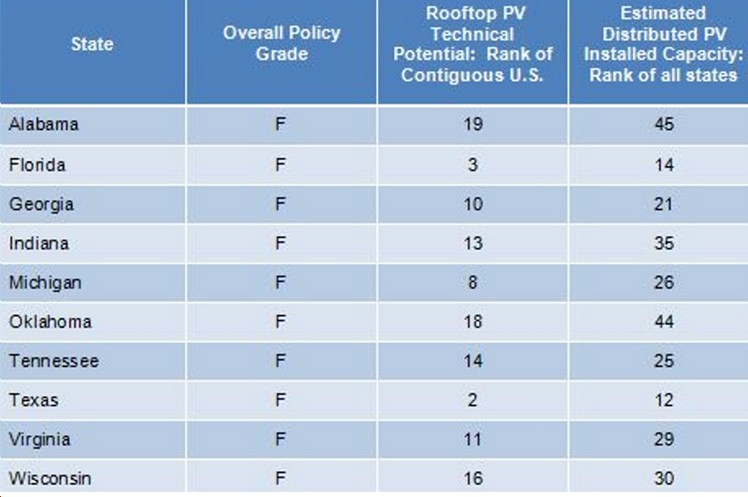 Needless to say, this is not something Virginia should be proud of.
Needless to say, this is not something Virginia should be proud of.
For this report, we analyze and highlight 10 states that are blocking distributed solar potential through overtly lacking and destructive distributed solar policy. These 10 states — Alabama, Florida, Georgia, Indiana, Michigan, Oklahoma, Tennessee, Texas and Virginia — account for more than 35 percent of the total rooftop solar photovoltaic (PV) technical potential in the contiguous United States, but only 6 percent of total installed distributed solar capacity, according to a March 2016 report released by National Renewable Energy Laboratory (NREL) and data provided by the U.S. Energy Information Agency. All of these states have significant barriers in place to distributed solar development and have earned an overall policy grade of “F” in our analysis. We based these grades on a thorough review of the presence, or absence, and strength of key distributed solar policies, and, combined with the overall rooftop solar photovoltaic technical potential rankings by National Renewable Energy Laboratory (NREL), identified the states that would benefit most from improvements to their distributed solar policy landscapes.
What are the main problems in Virginia? According to the report:
- Virginia “only has a voluntary RPS with no solar carve-out, unclear legality for third-party ownership and no community solar.”
- Virginia’s “weak net metering improved slightly when the legislature signed S.B. 1395 into law in March 2015, which allowed for more mid-size installations by increasing the net-metering system size limits from 500 kW to 1000 kW. However, this is still an overall weak program in that it requires that customers create a power purchase agreement with their utility, which is up to the utility’s discretion, prior to connecting their PV solar system to the grid. This barrier prevents potential solar customers from accessing net-metering program benefits and ultimately gives all power to the utility rather than ensuring solar customers are compensated fairly for the energy they provide.”
Why does Virginia have such godawful policy when it comes to spurring the growth of clean energy and transitioning as rapidly as possible off of dirty fossil fuels, which we MUST do on an urgent basis for pressing economic and environmental reasons? The report doesn’t address this specifically in Virginia, but the answers — to all of us who follow Virginia politics — are crystal clear: 1) a state government, along with regulatory agencies, that have been effectively “captured” by the very polluting industries they are supposed to be regulating; 2) a strong “Dillon Rule,” which prevents more environmentally-minded (and threatened) localities, like Arlington, Fairfax, Virginia Beach, etc., from enacting strong clean energy policies themselves; and 3) the uniquely powerful, and uniquely bad, Dominion Power, which has spent millions of dollars buying up our legislators, regulatory agencies, etc. in order to get their way every single time.
Change any (or preferably ALL) of those, and things would get better very quickly. Because the fact is, Virginia has enormous clean energy potential – energy efficiency, offshore wind, distributed and utility-scale solar – with the only major obstacles standing in the way of a clean energy boom being bad policies. The question is, how long are Virginia voters going to put up with this crap????
h/t to Ivy Main for alerting me to this report!


![VA DEQ: “pollution from data centers currently makes up a very small but growing percentage of the [NoVA] region’s most harmful air emissions, including CO, NOx and PM2.5”](https://bluevirginia.us/wp-content/uploads/2026/01/noxdatacenters.jpg)
![Thursday News: “Europe draws red line on Greenland after a year of trying to pacify Trump”; “ICE Agent Kills Woman, DHS Tells Obvious, Insane Lies About It”; “Trump’s DOJ sued Virginia. Our attorney general surrendered”; “Political domino effect hits Alexandria as Sen. Ebbin [to resign] to join Spanberger administration”](https://bluevirginia.us/wp-content/uploads/2026/01/montage010826.jpg)
![Sunday News: “Trump Is Briefed on Options for Striking Iran as Protests Continue”; “Trump and Vance Are Fanning the Flames. Again”; “Shooting death of [Renee Good] matters to all of us”; “Fascism or freedom? The choice is yours”](https://bluevirginia.us/wp-content/uploads/2026/01/montage011126.jpg)

![New Year’s Day 2026 News: Full Video of Jack Smith Testimony – “The attack that happened at the Capitol…does not happen without [Trump]”; Trump/RFK Jr Make Measles Great Again; Right-Wing YouTuber Nick Shirley Definitely Not a Real Journalist; Musk Did Enormous Damage in 2025](https://bluevirginia.us/wp-content/uploads/2026/01/montage010126.jpg)











